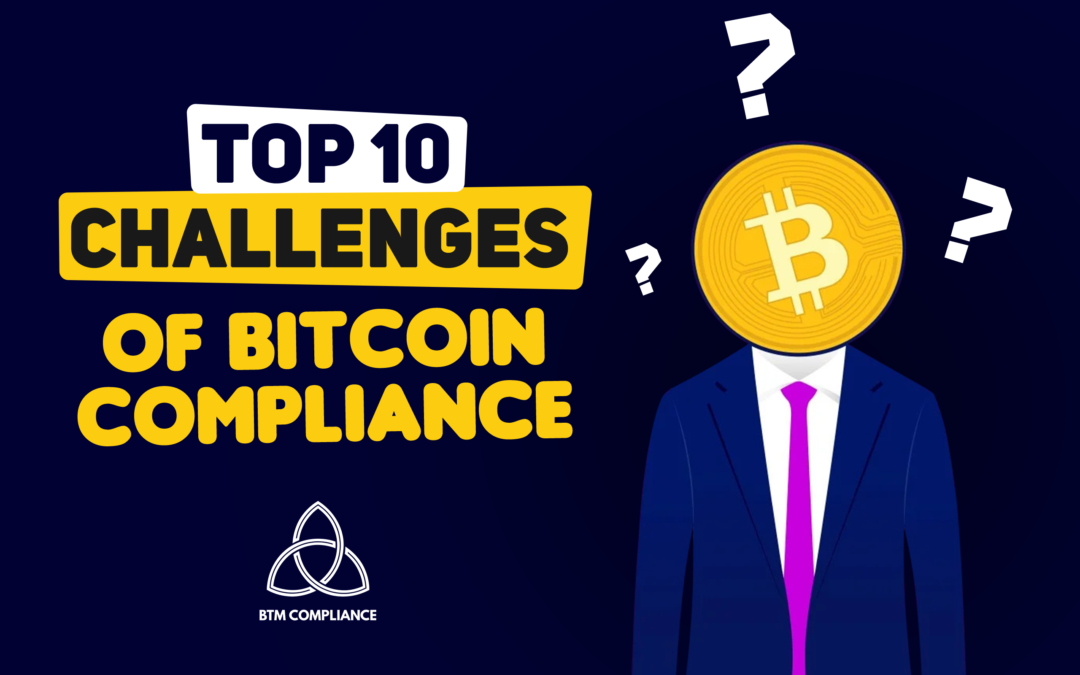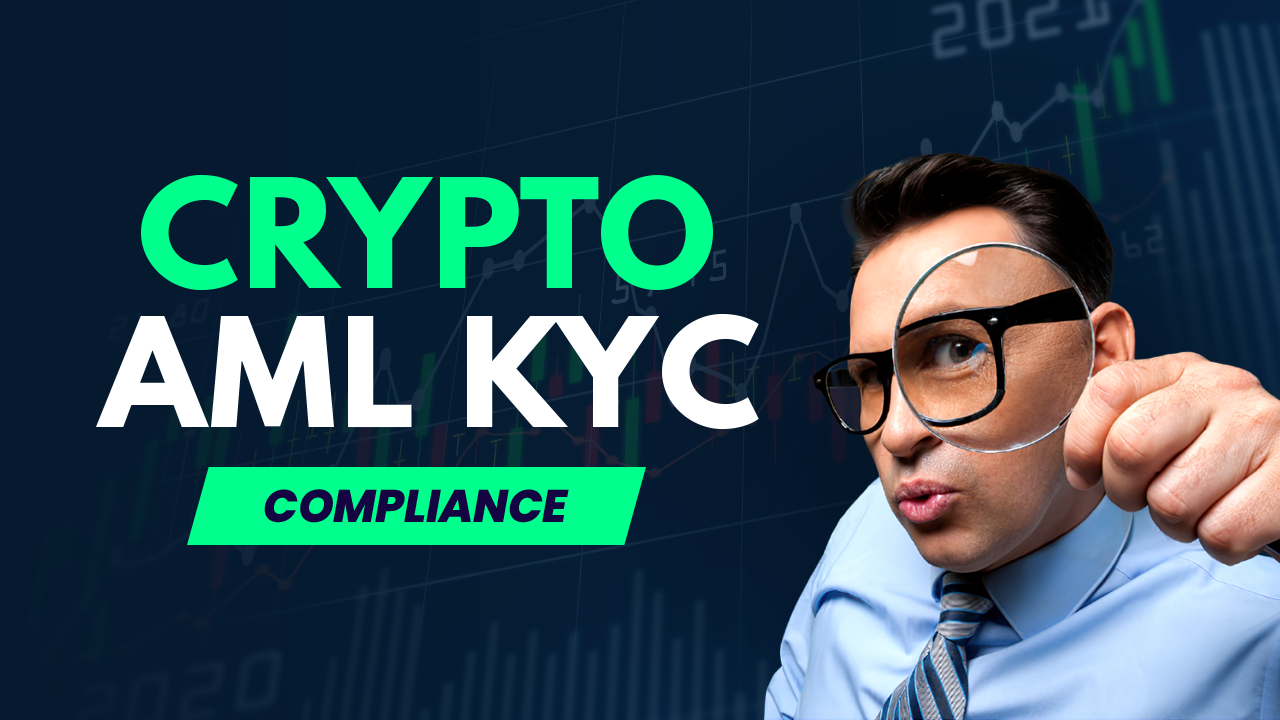More than a decade has passed since Satoshi Nakamoto launched the first blockchain network and digital currency, Bitcoin. It has transformed the financial world, spawning over 22,000 cryptocurrencies and accumulating a staggering market value of over $1 trillion.
This fast development of cryptocurrency technology and soon following raise of scammers has not gone unnoticed by authorities, regulators, and law enforcement agencies around the globe, who are closely monitoring the ever-changing landscape of criminal activities and financial crime in the crypto industry.
In this blog, we’ll delve into the top 10 challenges of cryptocurrency compliance, skillfully breaking down intricate concepts into engaging, relatable, and easy-to-understand nuggets of information.
As we explore these crypto compliance challenges, we’ll be touching on key concepts on a variety of topics such as crypto compliance measures, financial crimes, money laundering, crypto compliance technology, cryptocurrency compliance, and the legal status of digital assets, among others.
Table of Contents
- Navigating Regulatory Uncertainty
- AML and KYC Compliance
- Mastering KYC Requirements
- Transactions and Compliance
- Tax Compliance for Cryptocurrencies
- Licensing and Registration for Crypto Firms
- Strengthening Internal Controls and Auditing
- Compliance with Securities Laws
- Blockchain Forensics and Analytics
- Staff Training and Compliance Awareness
1. Regulatory Uncertainty
Imagine navigating through a maze without a clear map; that’s how crypto businesses often feel due to the lack of uniform regulations across countries. With the majority of countries having some form of cryptocurrency regulation, keeping up with the constantly changing landscape can be daunting for crypto companies. This regulatory risk and uncertainty pose a serious risk and significant compliance risk for businesses operating within the crypto sphere.
How can businesses balance innovation with compliance? By staying informed, agile, and adaptable. One approach to address this challenge is by integrating compliance technology and software automation into how companies meet daily operations, ensuring that businesses stay on top of the ever-evolving regulatory landscape.
2. Anti-Money Laundering (AML) and Know Your Customer (KYC) Compliance
A whopping 2-5% of global GDP ($800 billion to $2 trillion) is laundered every year, and cryptocurrencies are increasingly used in these illicit and fraudulent activities.
This has led to the development of strict AML regulations that crypto firms must adhere to prevent money laundering and terrorism financing.
How can businesses stay on the right side of AML/KYC requirements? By implementing effective compliance programs, monitoring for red flags with compliance employees, using compliance teams, and conducting risk assessments with compliance employees.
Additionally, embracing technologies such as blockchain forensics and transaction monitoring can aid in detecting fraudulent transactions and other financial crimes.
3. Know Your Customer (KYC) Requirements
Did you know that the majority of global financial institutions report delays in onboarding due to KYC requirements?
To tackle these challenges, businesses must collect and verify customer information, perform enhanced customer due diligence even for high-risk customers, integrate compliance technology, and strike a balance between privacy concerns and data protection.
The thorough onboarding procedure reduces the risks connected with illegal activities like market manipulation and money laundering by mule activity while assisting conventional financial institutions in ensuring compliance with KYC requirements.
4. Transactions and Compliance
Navigating the complex web of international laws and standards when dealing with virtual assets and commodities can feel like walking a tightrope. But businesses can ensure their crypto transactions run smoothly by staying in the know about bans, watchlist screening, money limits, and reporting requirements.
In today’s world, where decentralized finance (DeFi) and non-fungible tokens (NFTs) are rapidly gaining traction in the traditional financial system, digital asset trading platforms and cryptocurrency marketplaces need to be extra vigilant.
5. Tax Compliance
In 2020, only 807 people disclosed their use of cryptocurrencies on their tax forms. To avoid potential tax fines, it is essential to comprehend the tax consequences of one’s cryptocurrency assets and transactions, file accurate tax returns, and keep up with international tax laws.
Businesses in the cryptocurrency sector (including trading platforms, exchanges, wallets, and custodians) should consider utilizing cryptocurrency compliance and solutions to assist their customers in meeting their obligations.
6. Licensing and Registration
Did you know that the majority of cryptocurrency exchanges have the right licensing under their belt? So, if you’re keen on getting your business to join the top crypto exchanges’ compliance league, it’s vital to snag and maintain those essential licenses.
How can you stay compliant? The solution often lies in working hand-in-hand with regulators and keeping a pulse on licensing requirements across multiple jurisdictions. But wait, there’s more—you’ll also need to tick off the registration boxes set by several financial crime authorities like Financial Crimes Enforcement Network (FinCEN) and CFTC, among others.
7. Data Privacy
In our fast-paced digital world, data privacy has climbed the ranks to become a top concern. If you’re running a crypto business, it’s crucial to comply with data protection regulations. Plus, don’t forget to put robust safeguards in place to protect your customers’ information.
8. Implementing Effective Compliance Programs
Establishing a rock-solid crypto compliance program is an absolute must-have for businesses venturing into the crypto world!
Financial institutions, crypto companies, exchanges – anyone who dabbles in digital assets, really – should create tailor-made crypto compliance programs that cover all the bases: the AML regulations, KYC, and any other rules that apply.
But it doesn’t stop there. To make sure everyone’s on board and ensure compliance throughout, it’s essential to cultivate a culture of compliance within the organization.
How? By hiring top-notch compliance professionals and continuously training your team members.
9. Risk Management and Monitoring
Risk management is the beating heart of top-notch cryptocurrency compliance solutions. Businesses have to stay on their toes, identifying, assessing, and neutralizing any risks linked to financial products, digital and crypto assets, and crypto assets and transactions.
How? Let’s break it down:
- Start with risk assessments to pinpoint potential dangers tied to specific transactions or customers.
- Put transaction monitoring systems in place to spot and report any sketchy activities.
- Talk to your customers and ask for more information whenever necessary.
- And don’t forget to stay compliant with sanctions and watchlist screenings!
10. Collaboration with Regulators and Law Enforcement
Proactive engagement with regulators and law enforcement agencies can do wonders to boost regulatory awareness among crypto companies and help secure their compliance success.
By building bridges with bigwigs like the FinCEN, Securities and Exchange Commission (SEC), and even your friendly neighborhood law enforcement officers, you’re cultivating a culture of compliance that can stand the test of time.
Final Thoughts
In the wild world of cryptocurrency, businesses won’t make it far without being compliant. To successfully ride the rollercoaster of cryptocurrency compliance, they need to stay ahead of regulatory curveballs, embrace the best practices and programs, and harness the power of innovative blockchain technology.
So, just to recap, some of the biggest hurdles businesses face when trying to stay compliant in the ever-evolving cryptocurrency landscape include:
- Navigating the murky waters of regulatory uncertainty
- Staying on top of AML/CTF compliance
- Meeting the demands of KYC requirements
- Transactions and Compliance
- Keeping tax compliance in check
- Securing licenses and registrations
- Upholding data privacy standards
- Establishing rock-solid compliance programs
- Assessing and managing risks like a pro
- Teaming up with regulators and law enforcement for a brighter crypto future
Ultimately, a company’s ability to adjust to regulatory changes and maintain a strong compliance stance will determine its level of success in the cryptocurrency industry, in addition to innovation and market performance.
FAQs
How do Bitcoin ATMs fit into the compliance landscape?
Bitcoin ATMs, just like any other business dealing with cryptocurrencies, must adhere to local and federal regulations. Operators of Bitcoin ATMs are required to implement KYC procedures, conduct risk assessments, training, and ensure AML/KYC compliance.
Regular maintenance of records and reporting suspicious activities to relevant authorities are also vital components of managing compliance risk for Bitcoin ATMs.
How can businesses stay up-to-date with the rapidly changing cryptocurrency compliance environment?
To keep up with the ever-evolving cryptocurrency compliance landscape, businesses should closely monitor updates from regulatory bodies in their jurisdiction and at the federal and international levels.
Participating in industry conferences, subscribing to newsletters, and seeking expert legal advice can help businesses stay informed and maintain compliance with the latest regulations.
What are some common compliance risks faced by cryptocurrency businesses?
Cryptocurrency businesses may face compliance risks such as non-adherence to KYC/AML regulations, failure to report suspicious transactions, operating without proper licenses, and others.
Businesses need to address these risks through proactive compliance measures, internal audits, and employee training to mitigate potential penalties and reputational damage.
What role do cryptocurrencies play in Anti-Money Laundering (AML) and Know Your Customer (KYC) efforts?
As cryptocurrencies have become more popular, they’ve also been increasingly used for illicit activities. To counter this, businesses in the cryptocurrency space must comply with AML/KYC regulations.
This means keeping an eye out for any suspicious activity in transactions, evaluating the level of risk involved, following the Know Your Customer (KYC) guidelines, and informing the appropriate authorities if any suspicious behavior is detected.
Do you need help with your Bitcoin ATM compliance?
Contact us at https://www.btmcompliance.com/contact-us/






